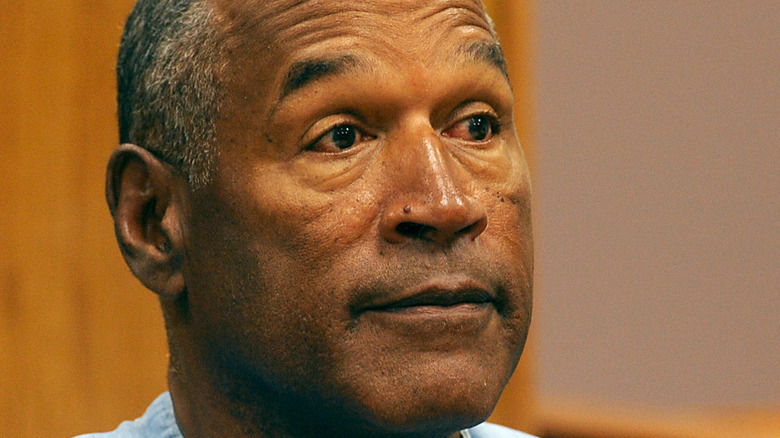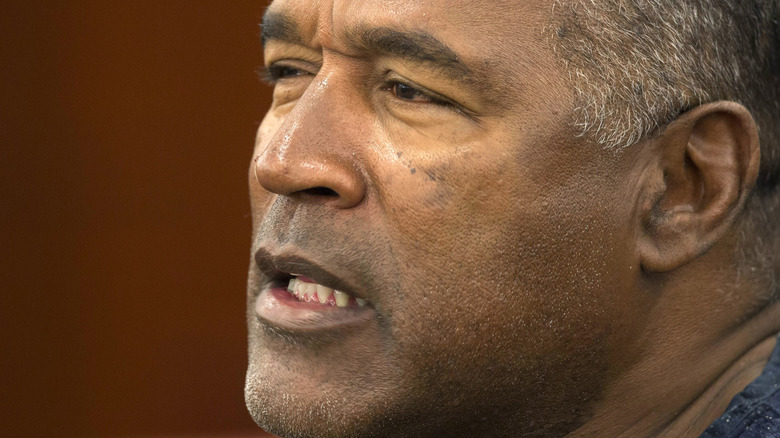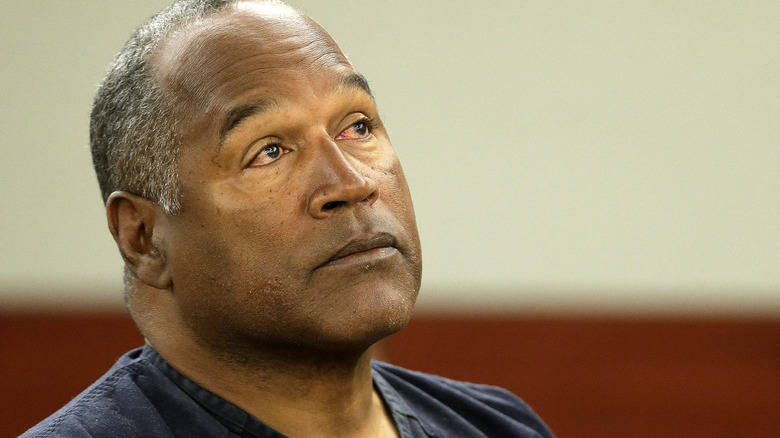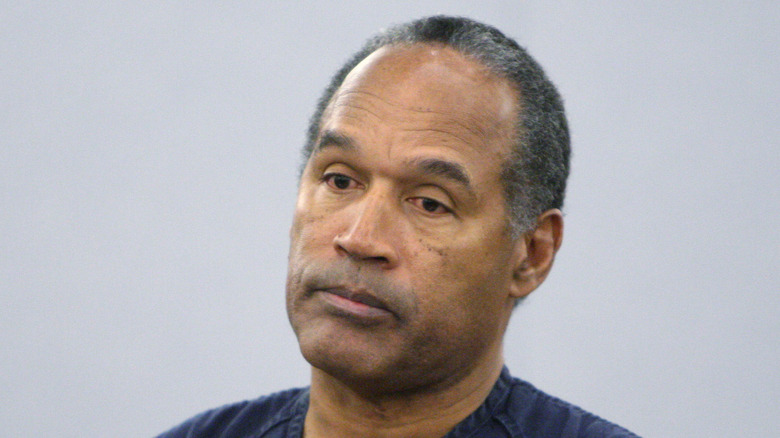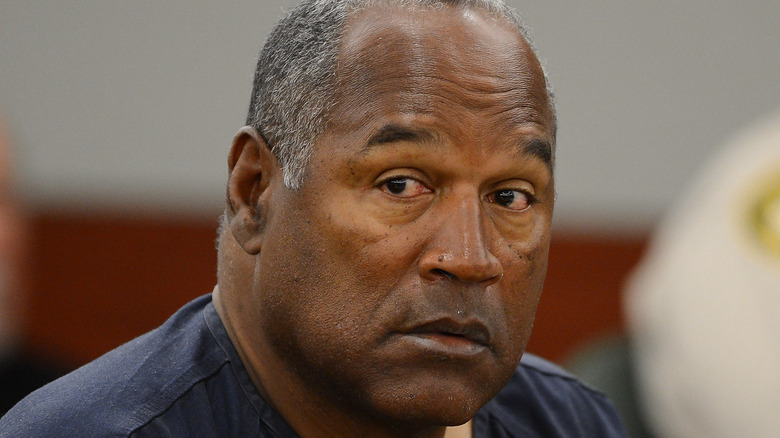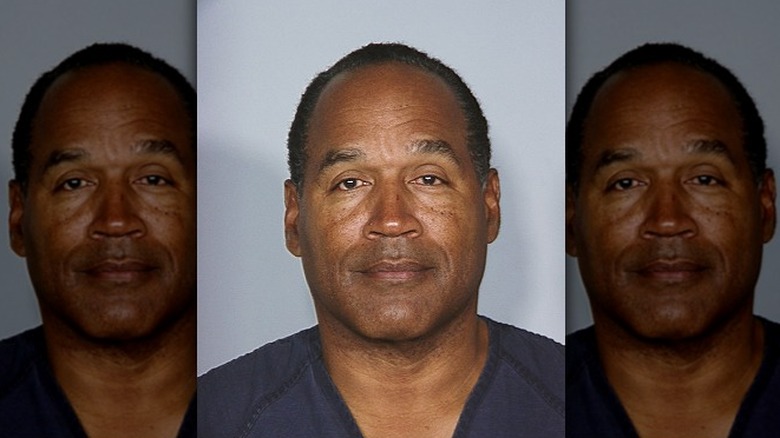The Truth About OJ Simpson's Relationship With His Father Jimmy Lee Simpson
Prior to 1994, Orenthal James (O.J.) Simpson was a well-respected and renowned NFL star, sports broadcaster, and actor. However, as reported by Biography, the brutal murders of his former wife Nicole Brown Simpson and her friend Ron Goldman on June 12, 1994, thrust him into the spotlight for a far more nefarious reason.
Within days of discovering Nicole and Goldman's bodies, authorities identified O.J. Simpson as the primary suspect in both murders. He was ultimately arrested and charged in the deaths of both victims. Simpson vehemently denied any involvement and pleaded not guilty to the criminal charges. Biography reports the so-called "Trial of the Century" began on January 24, 1995. As the trial involved a well-known celebrity and accusations of a particularly brutal murder, it was broadcast on network television and heavily covered by the national and international media.
Although Simpson was ultimately acquitted of both murders on October 3, 1995, the conclusion of the trial remains a point of heated controversy. However, Simpson's legal troubles are not the only controversy he has faced — he also had a contentious relationship with his father.
His parents divorced when he was 5 years old
A native of San Francisco, California, Biography reports O.J. Simpson was born on July 9, 1947, to Eunice and Jimmy Lee Simpson. In 1952, when O.J. was 5 years old, his parents divorced, and he was essentially raised by a single mother. At some of the most important moments in his life, O.J.'s mother was either present or was mentioned by him. As reported by Yahoo! Sports, he specifically referred to his mother, who he called "the best mother in the neighborhood," when he was inducted into the Pro Football Hall of Fame. She was also present throughout his murder trial and took the stand on her son's behalf.
The Buffalo News reports Eunice Simpson died of natural causes in November 2001 at her Bayview District, California home, which was purchased for her by her famous son. For O.J., the loss was even more devastating as he remained largely estranged from his father following his parents' divorce.
Jimmy Lee and O.J. Simpson were never close
Jimmy Lee Simpson was present when O.J. Simpson was inducted into the Pro Football Hall of Fame, although O.J. did not publicly acknowledge him during the ceremony. Afterward, Jimmy told Jet magazine (via Bustle) that he had "great pride in his son's accomplishments." However, Yahoo! Sports reports that O.J. was disappointed that his father was largely absent through his formative years.
In a 1977 interview with Parents magazine (via The New York Times), O.J. said, "I resented his absence, especially when I became a teenager and was trying to find out who I was ... I really needed a man around then for guidance." Although O.J. said he and his father had been attempting to build a closer relationship, he admitted it had "taken years for [him] to come to terms with [his] feelings." As reported by Yahoo! News, one of the factors that may have contributed to the tension between O.J. and his father was the fact that Jimmy was reportedly gay.
Jimmy Lee Simpson was reportedly gay
According to O.J. Simpson's childhood friend, Calvin Tennyson, he and O.J. discovered Jimmy Lee was gay during an accidental encounter. As reported by the Daily Mail, Tennyson said, "One day we went over to his dad's house ... And when his dad opened the door, he was in a bathrobe ... then his dad kind of opened the door more, and there was a guy in the back in a bathrobe."
Tennyson said the entire situation was awkward and tense, but he and O.J. eventually laughed about it. However, Tennyson said it "was obvious that [O.J.'s] dad was gay." As reported by the Daily Mail, Tennyson eventually told Joe Bell, who was friends with him and O. J., that Jimmy Lee was gay, but Bell said he did not want to discuss it. In a later interview, Bell said, "Back in our day, that was the worst thing in the world that you could ever think about. An African-American man being a homosexual."
O.J. Simpson's father was reportedly a drag queen
In the midst of the publicity surrounding O.J. Simpson's criminal trial, author George Carpozi Jr. published a book titled "The Lies of O.J. Simpson," which included an excerpt about Jimmy Lee Simpson. As reported by Bustle, the book detailed an account from an unnamed source who provided evidence to support the rumors that Jimmy Lee Simpson was gay. According to the source, Jimmy was openly gay and was well known throughout the neighborhood as a drag queen. The unnamed source said, "Mama Simpson, as he was known to me, used to hang around the hotel where I lived and was frequently dressed in drag." The source also claimed everyone in the neighborhood was aware that Jimmy was O.J.'s father.
Bustle reports another book about O.J. — written by Jeffrey Toobin and was titled "The Run of his Life" — also claimed Jimmy was openly gay and was an active member of San Francisco, California's drag community.
Jimmy Lee Simpson was rumored to have died of AIDS
Jimmy Lee Simpson died in 1986. According to his obituary, he was employed by San Francisco's Federal Reserve for 35 years, and his cause of death was reported to be cancer. However, as reported by Bustle, Jeffrey Toobin's book suggests Jimmy actually died of complications related to AIDS. It is also unclear how long Jimmy actually worked for the bank, as some sources said he was a custodian at the Federal Reserve and only worked there for a short time.
O.J. Simpson has never discussed rumors that his father was gay and was a drag queen. However, as reported by Insider, O.J. reportedly expressed disdain for homosexuals in the past. According to the ESPN documentary "O.J.: Made In America," O.J. once lost his temper when his then-wife Nicole allowed the couple's son to sit next to a gay man while they were dining at a restaurant. In recent years, however, O.J. expressed his support for openly gay football player Carl Nassib. As reported by The Source, O.J. responded to Nassib coming out by saying, "Aye ... more power to you, man. That's terrific."
